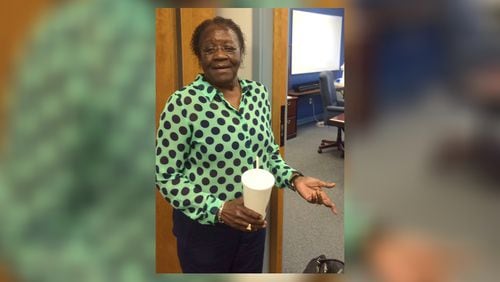Martha Blue, the outgoing chief of the Division of Family and Children Services office in Macon, was tickled a reporter would drive 100 miles from Atlanta just to come see her.
“You just want to see what a nut looks like,” she said with a cackle, which was how she punctuated lots of her sentences.
Than was in late July, just days before Blue would retire from the only job she has ever had, working with poor and dysfunctional families in Bibb County. She’d been doing that since February 1964 when she returned home with a psychology degree from Tennessee State and joined the Public Welfare Department.
“I thought I could change the world,” she recalled of her youthful exuberance when starting the $344-a-month job.
Well then, 50 years later, how did it go?
“I made some changes,” she said. “But the more you do, the more it keeps coming at you. There’s no end. They keep coming and keep coming.”
Poverty, mental illness, sexual abuse, drug use, ignorance, neglect — it’s all been like waves at the beach. “We’ve been the emergency room for the county,” she said.
I called on Blue — everyone calls her “Blue” — after hearing about a half-century stint in one of the toughest, most thankless jobs imaginable.
In June, Gov. Nathan Deal appointed Bobby Cagle to head the long-troubled state agency. I checked and found there have been 10 state DFCS directors since 1997, with an average stay of 22 months. The tenure is brief for many reasons: huge turnover in the ranks, case overload, poor morale, internal back-biting and when something really bad happens — and it always does — the DFCS chief is as good a person as any to get tossed under the bus.
“Georgia’s Most Disposable Leader,” we called the job.
So when I heard of Blue’s longevity, it was like hearing about the two-headed calf they keep in a display case over at the state Capitol.
DFCS was segregated when she began
Blue is living history. She started when the agency was segregated. For the first couple years, she could only check in on black families, although white case workers could deal with both races.
The Food Stamp Act of 1964 had not been passed and the American nuclear family hadn’t disintegrated.
“Back then we did everything,” she said, meaning the caseworker was full-service. “You knew the families. You knew grandma’s issues and mama’s issues.”
Today, the state’s Department of Human Services, which oversees DFCS, is trying to get back to some of that, to cut down on the “silos” of disparate departments and programs that can compete with and even undercut each other.
Drugs like coke, meth and heroin have accelerated the societal disintegration like nothing else, Blue said, so has the breakup in the family.
Back when, she said, “most of my clients drank. There was neglect but it was not willful. Most of it was from poverty. There was no meth.”
Now just finding or keeping track of her clients is a chore. “People move a lot more now,” she said. “People were a lot more stable.”
“The good old days are gone,” she said laughing, with a hint of irony, knowing that for those in the welfare/child business there have really never been good old days.
For 30 years, from 1983 to last year, Blue was the Bibb County’s deputy director, the hands-on chief of the office and last year was finally given the top job.
They have had their work cut out for them in Macon. According to Census surveys, the county has a higher percentage of children in poverty than the state (39 to 25), a higher percentage of children living with single parents (47 to 33), more than twice the number of substantiated child abuse cases (20 per 1,000 children versus 8 per 1,000.)
‘Nobody wants to be on welfare’
But that’s the sea in which Blue had to swim, so she did what she could. You can’t dwell ceaselessly on the problems, although she spent many a sleepless night. You just have to tackle each case as it comes in, one by one, use common sense and hope for the best.
“No day when you come to work you know what is going to happen,” she said.
Did she ever think about leaving? Never, she said, although it is a high-turnover job, where caseworker pay starts out perhaps $27,000. If it all gets to be too much, there are jobs in the school system with less stress. Or there’s Geico, which is the county’s private employer and a beacon for those who can’t stand the pressure and woe that comes with injecting themselves into other people’s problems.
Part of the job is empathy, part is persuading people to be more accountable.
Blue is proud that she has helped push countless people off welfare and back to work. The county agency built a day care center at the office to allow single mothers to rejoin the work force.
“I still see people in the neighborhood who say, ‘Mrs. Blue, I’m still working,’ ” she said. “The public has a low opinion about people on welfare. People see them as lazy. I don’t see it. Nobody wants to be on welfare.”
As Blue carried five decades of belongings out of her office, she just wanted it known that, by and large, DFCS workers do give a hoot, that they are often overworked, underpaid and are torn up probably worse than anybody when something goes wrong.
And, she figured, she couldn’t have spent 50 years any better than she did.
About the Author







